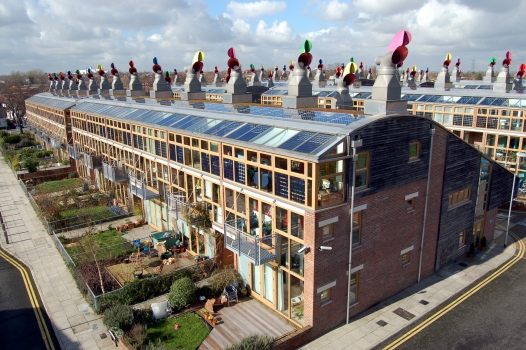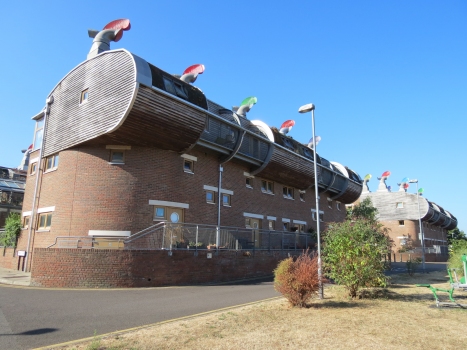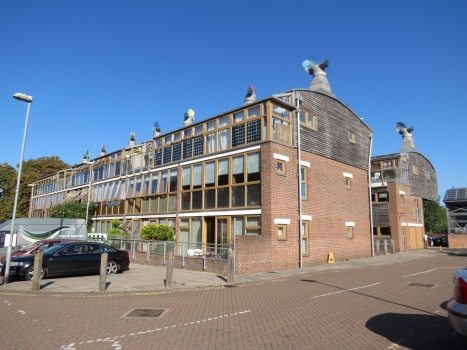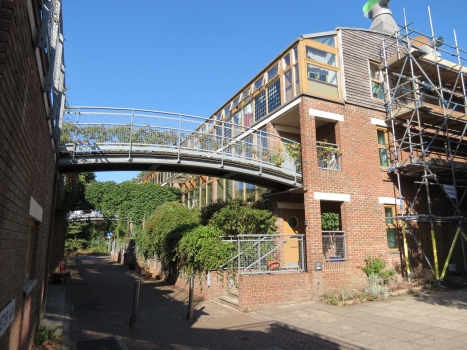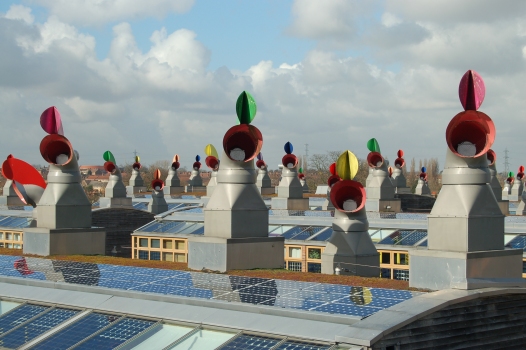General Information
| Other name(s): | Beddington Zero Energy Development |
|---|---|
| Beginning of works: | 2000 |
| Completion: | 2002 |
| Status: | in use |
Project Type
| Function / usage: |
Residential building |
|---|---|
| Energy efficiency: |
for registered users for registered users |
Location
| Location: |
Sutton, London, England, United Kingdom |
|---|---|
| Address: | London Road |
| Coordinates: | 51° 22' 55.78" N 0° 9' 21.31" W |
Technical Information
Dimensions
| number of apartments | 82 |
Cost
| construction cost (without tax) | ca. Pound sterling 14 000 000 |
Excerpt from Wikipedia
Beddington Zero Energy Development (BedZED) is an environmentally friendly housing development in Hackbridge, London, England. It is in the London Borough of Sutton, 2 miles (3 km) north-east of the town of Sutton itself. Designed to create zero carbon emissions, it was the first large scale community to do so.
Background
BedZED was designed by the architect Bill Dunster to be carbon neutral, protecting the environment and supporting a more sustainable lifestyle. The project was led by the Peabody Trust in partnership with Bill Dunster Architects, Ellis & Moore Consulting Engineers, BioRegional, Arup and the cost consultants Gardiner and Theobald. The project was also pioneering by being the first construction project where a local authority sold land at below market value to make sustainable development economically viable.
The 82 homes and 1,405 square meters (15,120 sq ft) of workspace were built within the period of 2000–2002. The project was shortlisted for the Stirling Prize in 2003.
Transport
As part of BedZED's eco-friendly low-energy-emission concept, cars are discouraged; the project encourages public transport, cycling and walking, and has limited parking space. There are good rail and bus links in the immediate area. They also have a car-share scheme.
Principles
BedZED buildings BedZED façade at dusk Side of one of the buildings at BedZED Wind cowls
- Zero energy—The project is designed to use only energy from renewable sources generated on-site. There are 777 square meters (8,360 sq ft) of solar panels. Tree waste was to fuel the development's cogeneration plant (a downdraft gasifier) to provide district heating and electricity. The gasifier was abandoned because of technical implementation problems.
- High quality – The apartments are finished to a high standard to attract the urban professional.
- Energy-efficient – The houses face south to take advantage of solar gain, are triple glazed, and have high thermal insulation.
- Water-efficient – Most rain water falling on the site is collected and reused. Appliances are chosen to be water-efficient and use recycled water when possible. A "living machine" system of recycling waste water was installed but did not achieve the required water quality standards.
- Low-impact materials – Building materials were selected from renewable or recycled sources within 50 miles (80 km) of the site, to minimize the energy required for transportation.
- Waste recycling – Refuse-collection facilities are designed to support recycling.
- Transport – The development works in partnership with the United Kingdom's leading car-sharing operator, City Car Club. Residents are encouraged to use this environmentally friendly alternative to car ownership; an on-site selection of vehicles are available for use.
- Encourage eco-friendly transport – Electric and liquefied-petroleum-gas cars have priority over cars that burn petrol and diesel, and electricity is provided in parking spaces for charging electric cars.
- A higher reported quality of life, with a strong sense of community.
Performance
Monitoring conducted in 2003 found that BedZED had achieved these reductions in comparison to UK averages:
- Space-heating requirements were 88% less.
- Hot-water consumption was 57% less.
- The electrical power used, at 3 kilowatt hours per person per day, was 25% less than the UK average; 11% of this was produced by solar panels. The remainder normally would be produced by a combined-heat-and-power plant fuelled by wood chips, but the installation company's financial problems have delayed use of the plant.
- Mains-water consumption has been reduced by 50%, or 67% compared to a power-shower household.
- The residents' car mileage is 65% less.
Problems
A review of the BedZed development in 2010 drew mainly positive conclusions. Residents and neighbors were largely happy. However, a few significant failures were highlighted, for example:
- The biomass wood chip boiler (biomass gasifier) was no longer in operation and the backup power source, a gas boiler, was used from 2005 - 2017. The downdraft wood chip gasifier CHP (combined heat and power) had reliability problems due to technical problems and the intermittent schedule of operation (no late-night operation) imposed by the local authority. However, BedZED switched from gas back to a biomass pellet boiler in 2017 which provides heat for the district heating network but not electricity, which is now sourced from the grid on a green tariff. The biomass pellets are now sourced from Spain, not from local wood waste.
- The 'Living Machine' water recycling facility had been unable to clean the water sufficiently. The cost of the facility also made it unviable.
- Passive heating from the sunspaces had been insufficient.
The results show that the average ecological footprint of a BedZED resident is 4.67 global hectares (2.6 planets), which is 89% of the baseline. This would reduce to 4.32 global hectares (2.4 planets) if the energy was all zero carbon. However, a keen resident at BedZED (if the CHP was working) could achieve an ecological footprint of 3.0 global hectares (1.7 planets) which is 57% of the average. The target was 1 planet.
Text imported from Wikipedia article "BedZED" and modified on April 11, 2020 according to the CC-BY-SA 4.0 International license.
Participants
Relevant Web Sites
Relevant Publications
- (2003): BedZED. In: The Arup Journal, v. 38, n. 1 ( 2003), pp. 10-16.
- The Phaidon Atlas of Contemporary World Architecture. Travel Edition. Phaidon, London (United Kingdom), 2005, pp. 438.
- The Phaidon Atlas of Contemporary World Architecture. Comprehensive Edition. Phaidon, London (United Kingdom), pp. 152.
- (2009): Towards sustainable residential communities; the Beddington Zero Energy Development (BedZED) and beyond. In: Environment and Urbanization, v. 21, n. 2 (September 2009), pp. 527-544.
- About this
data sheet - Structure-ID
20018911 - Published on:
13/12/2005 - Last updated on:
11/04/2020

